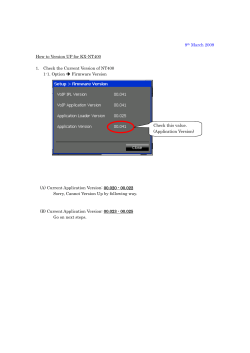
How to port a TCP/IP stack in your kernel Nassim Eddequiouaq
How to port a
TCP/IP stack in
your kernel
Nassim
Eddequiouaq
How to port a TCP/IP stack in your kernel
without an Ethernet driver
Introduction
TCP/IP stacks
Focus on lwIP
Conclusion
Nassim Eddequiouaq
July 20, 2014
Plan
How to port a
TCP/IP stack in
your kernel
Nassim
Eddequiouaq
Introduction
TCP/IP stacks
1 Introduction
Focus on lwIP
Conclusion
Generic TCP/IP stack
How to port a
TCP/IP stack in
your kernel
Nassim
Eddequiouaq
Introduction
TCP/IP stacks
Focus on lwIP
Conclusion
Plan
How to port a
TCP/IP stack in
your kernel
Nassim
Eddequiouaq
Introduction
TCP/IP stacks
2 TCP/IP stacks
Focus on lwIP
Conclusion
Which free open source stacks ?
How to port a
TCP/IP stack in
your kernel
Nassim
Eddequiouaq
Introduction
• uIP
TCP/IP stacks
• lwIP
Focus on lwIP
• tinytcp, wattcp..
Conclusion
• fNET
• Bentham’s TCP/IP stack
• OpenBSD → not standalone
Focus on what you need
How to port a
TCP/IP stack in
your kernel
Nassim
Eddequiouaq
Introduction
• embedded ?
• bare metal ? (no operating system)
• Keep It Simple, Stupid ?
• fast ?
• out of the box ?
Your choice.
TCP/IP stacks
Focus on lwIP
Conclusion
uIP
How to port a
TCP/IP stack in
your kernel
Nassim
Eddequiouaq
Introduction
• world’s smallest TCP/IP Stack
TCP/IP stacks
• used mostly for 8/16 bits microcontrollers
Focus on lwIP
• separates 32-bit arithmetic
Conclusion
• useful for embedded systems
• uses polling
• handles TCP, UDP (poorly), IPv4
uIP simple example
How to port a
TCP/IP stack in
your kernel
# define UIP_ACTIVE_OPEN 1
void setup () {
connect_test ();
}
Nassim
Eddequiouaq
Introduction
TCP/IP stacks
void loop () {
uip_send ("foo\n", 4);
}
void connect_test (void) {
uip_ipaddr_t ipaddr ;
uip_ipaddr (& ipaddr , 192, 168, 1, 100);
uip_connect (& ipaddr , HTONS (8080));
}
[...]
Focus on lwIP
Conclusion
lwIP
How to port a
TCP/IP stack in
your kernel
Nassim
Eddequiouaq
Introduction
• works with IRQs
• which makes it VERY fast
• DHCP, AUTO-IP, ARP, UDP, PPP. . .
• works well even with few RAM
• several layouts of API
TCP/IP stacks
Focus on lwIP
Conclusion
fNET structure
How to port a
TCP/IP stack in
your kernel
Nassim
Eddequiouaq
Introduction
TCP/IP stacks
Focus on lwIP
Conclusion
fNET
How to port a
TCP/IP stack in
your kernel
Nassim
Eddequiouaq
Introduction
TCP/IP stacks
• mostly for 32bits microcontrollers
• supports ARM, Coldfire and Power Architecture
• TCP, UDP, IPv4, IPv6
• HTTP server, DHCP client, DNS. . .
Focus on lwIP
Conclusion
Plan
How to port a
TCP/IP stack in
your kernel
Nassim
Eddequiouaq
Introduction
3 Focus on lwIP
Port lwIP
Test and debug
TCP/IP stacks
Focus on lwIP
Port lwIP
Test and debug
Conclusion
Plan
How to port a
TCP/IP stack in
your kernel
Nassim
Eddequiouaq
Introduction
3 Focus on lwIP
Port lwIP
Test and debug
TCP/IP stacks
Focus on lwIP
Port lwIP
Test and debug
Conclusion
lwIP structure
lwIP offers 3 APIs:
• Raw API
• Netconn API
• BSD Socket API
How to port a
TCP/IP stack in
your kernel
Nassim
Eddequiouaq
Introduction
TCP/IP stacks
Focus on lwIP
Port lwIP
Test and debug
These APIs are layered in term of abstraction as follows:
Very useful!
Conclusion
lwIP structure
How to port a
TCP/IP stack in
your kernel
Nassim
Eddequiouaq
Introduction
TCP/IP stacks
Focus on lwIP
Port lwIP
Test and debug
Conclusion
Raw API
How to port a
TCP/IP stack in
your kernel
Nassim
Eddequiouaq
Introduction
This is the core API of lwIP
• best performances
• handles asynchronous events
• does not need an OS, bare metal works
TCP/IP stacks
Focus on lwIP
Port lwIP
Test and debug
Conclusion
Netconn API
How to port a
TCP/IP stack in
your kernel
Nassim
Eddequiouaq
This is the sequential API:
• allows multi-threading
• needs an OS
• lower performances than Raw API
• easier to use
• needs much more memory
Introduction
TCP/IP stacks
Focus on lwIP
Port lwIP
Test and debug
Conclusion
BSD Socket API
How to port a
TCP/IP stack in
your kernel
Nassim
Eddequiouaq
Introduction
TCP/IP stacks
A Berkeley-like Socket implementation:
Focus on lwIP
Port lwIP
• POSIX compliant
• very portable
Test and debug
Conclusion
Initialize the lwIP stack
How to port a
TCP/IP stack in
your kernel
Nassim
Eddequiouaq
Two ways:
• single-threaded:
Introduction
TCP/IP stacks
Focus on lwIP
Port lwIP
lwip_init()
• multi-threaded:
tcpip_init(...)
The second one calls implicitly the first one
Test and debug
Conclusion
Your network interface
How to port a
TCP/IP stack in
your kernel
Nassim
Eddequiouaq
Introduction
First, setup the compiler abstraction layer.
In ‘cc.h’, define macros describing your processor and
your compiler for :
• types
• byte ordering
• structure packing
TCP/IP stacks
Focus on lwIP
Port lwIP
Test and debug
Conclusion
Your network interface
How to port a
TCP/IP stack in
your kernel
Nassim
Eddequiouaq
lwIP is able to use higher-level mechanisms and
structures.
Introduction
TCP/IP stacks
In ‘sys_arch.c’, you may define a set of wrappers in
order to make it access:
• semaphores
• mailboxes
• threads
This file is optional
Focus on lwIP
Port lwIP
Test and debug
Conclusion
Start your network interface
How to port a
TCP/IP stack in
your kernel
Nassim
Eddequiouaq
Add the interface:
Introduction
• struct *netif netif_add(...)
TCP/IP stacks
• specify IP address, netmask, gateway address
Focus on lwIP
Port lwIP
Test and debug
Set the interface up:
• static IP address: netif_set_{up,down}
• DHCP: dhcp_{start,stop}
• AUTO-IP: autoip_{start,stop}
Conclusion
Initialize your device driver
How to port a
TCP/IP stack in
your kernel
Nassim
Eddequiouaq
netif_add(...) takes (among other parameters) the init
and input functions.
Introduction
TCP/IP stacks
Focus on lwIP
Port lwIP
You must provide these two functions with defined
prototypes:
• err_t foo_init(struct netif *netif)
• err_t foo_input(struct pbuf *p,
struct netif *netif)
Test and debug
Conclusion
Set your net interface properly
How to port a
TCP/IP stack in
your kernel
Nassim
Eddequiouaq
Set your struct netif during initialization:
• state fields (i.e hardware address
and length, MTU, name. . . )
• functions fields (output, link_output, input)
• flag field: OR options you want to activate
(broadcast, PPP, ARP. . . )
Introduction
TCP/IP stacks
Focus on lwIP
Port lwIP
Test and debug
Conclusion
Your driver’s ouput functions
How to port a
TCP/IP stack in
your kernel
There are two function pointers that you need to set:
• netif->linkoutput
• netif->output
Implement the following functions:
• err_t foo_linkoutput(...): called when a raw link
packet is ready to be send and does the actual
transmission
• err_t foo_output(...): called when an IP packet
is ready for transmission
foo_output should call foo_linkoutput when the
treated packet is ready.
Nassim
Eddequiouaq
Introduction
TCP/IP stacks
Focus on lwIP
Port lwIP
Test and debug
Conclusion
Your driver’s input management
How to port a
TCP/IP stack in
your kernel
Nassim
Eddequiouaq
When you receive a packet, pass it to foo_netif->input.
Introduction
TCP/IP stacks
Focus on lwIP
Port lwIP
This field has been set by your netif_add call, the last
parameter being a function pointer:
• err_t (*input)(struct pbuf *p, struct netif
*netif)
Test and debug
Conclusion
Sum up
How to port a
TCP/IP stack in
your kernel
1 Call lwip_init() / tcpip_init(...)
2 Ethernet init function to pass to netif_add(...)
Nassim
Eddequiouaq
Introduction
TCP/IP stacks
3 Ethernet input function to pass to netif_add(...)
Focus on lwIP
Port lwIP
4 Setup struct netif to pass to netif_add(...)
Test and debug
Conclusion
5 Ethernet link_output function and add it to struct netif
6 Ethernet output function and add it to struct netif
7 Call netif_add(...)
8 Set default network interface with netif_set_default(...)
9 Set interface to ‘UP’ with netif_set_up(...)
Plan
How to port a
TCP/IP stack in
your kernel
Nassim
Eddequiouaq
Introduction
3 Focus on lwIP
Port lwIP
Test and debug
TCP/IP stacks
Focus on lwIP
Port lwIP
Test and debug
Conclusion
How to test your network interface ?
How to port a
TCP/IP stack in
your kernel
Remember, we have no Ethernet driver yet!
Several solutions:
• init another lwIP inside your kernel as a standalone
module
• setup a protocol control block (PCB) and a TCP
connection associated to this PCB
• activate the TCP connection
• make it tcp_write(...) data to your network
interface
• create a TAP device before starting qemu and make
it output/input data
Nassim
Eddequiouaq
Introduction
TCP/IP stacks
Focus on lwIP
Port lwIP
Test and debug
Conclusion
Debugging your stack
How to port a
TCP/IP stack in
your kernel
Nassim
Eddequiouaq
There are some rough edges, you might want to tweak
your stack:
• a debugger, a JTAG → what if you don’t have one ?
• printf / built-in debug → quite nice actually!
1 #define LWIP_DEBUG 1
2 #define IP_DEBUG LWIP_DBG_ON
3 configure debug messages in ‘opt.h’ and ‘lwipopts.h’
Introduction
TCP/IP stacks
Focus on lwIP
Port lwIP
Test and debug
Conclusion
Some useful data
Figure: Lines of code in lwIP
How to port a
TCP/IP stack in
your kernel
Nassim
Eddequiouaq
Introduction
TCP/IP stacks
Focus on lwIP
Port lwIP
Test and debug
Conclusion
Linux networking stack had more than 25000 lines of
code solely under net/ipv4 directory with ‘tcp_*.c’ files
in 2012. . .
Also, lwIP takes less than 14 kB in term of object code
size. In comparison, Linux TCP/IP minimal stack size
takes 153 kB.
Plan
How to port a
TCP/IP stack in
your kernel
Nassim
Eddequiouaq
Introduction
TCP/IP stacks
4 Conclusion
Focus on lwIP
Conclusion
Conclusion
How to port a
TCP/IP stack in
your kernel
Nassim
Eddequiouaq
If you want something scalable, lwIP is a very good
solution!
Currently porting it myself to Stos.
Very active community around the project!
Tons of examples.
Introduction
TCP/IP stacks
Focus on lwIP
Conclusion
Questions ?
How to port a
TCP/IP stack in
your kernel
Nassim
Eddequiouaq
Introduction
TCP/IP stacks
Feel free to ask at:
• nass@lse.epita.fr
• nass on #lse @irc.rezosup.org
Focus on lwIP
Conclusion
Link
How to port a
TCP/IP stack in
your kernel
Nassim
Eddequiouaq
Adam Dunkels’ (uIP and lwIP creator) thesis:
http://static2.wikia.nocookie.net/__cb20100724070440/mini6/
images/0/0e/Lwip.pdf
Introduction
TCP/IP stacks
Focus on lwIP
Conclusion
lwIP Wiki:
http://lwip.wikia.com/wiki/LwIP_Wiki
lwIP -new- homepage, mailing list, forum:
http://savannah.nongnu.org/projects/lwip/
© Copyright 2025










